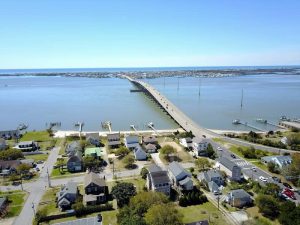Morehead City, Beaufort, and New Bern, North Carolina, are attractive vacation destinations. The coastal charm and natural beauty draw countless visitors each year.  With elevated traffic, including a higher number of out-of-town drivers, accidents are common for visitors and locals alike during peak seasons.
With elevated traffic, including a higher number of out-of-town drivers, accidents are common for visitors and locals alike during peak seasons.
This guide is designed specifically for visitors.
You’ll find helpful information about insurance claims, legal support, the statute of limitations, contributory negligence, and the nuances of the drunk driving laws in North Carolina.
Understanding Vehicle Insurance in North Carolina: UM/UIM
What is Uninsured and Underinsured Motorist Coverage (UM/UIM)?
North Carolina law mandates certain types of vehicle insurance for vehicles registered in the Pine State:
- Uninsured Motorist Coverage (UM): This protects you if an at-fault driver lacks insurance, covering your losses.
- Underinsured Motorist Coverage (UIM): If the at-fault driver’s insurance is insufficient, UIM covers the remaining costs.
- Importance of UM/UIM: In a tourist area with many out-of-state drivers, understanding and utilizing UM/UIM can be vital to protecting yourself financially. To be clear, some states do not require UM/UIM coverage. Indeed, not every state requires car insurance for vehicles.
Handling Drunk Driving Wrecks – Punitive Damages
Vacation season sees an uptick in drunk driving accidents.
North Carolina has strict laws against drunk driving, and it could lead to punitive damages, which are meant to punish the offender.
- An attorney can help collect evidence of impairment, which may be crucial for your case
- Unlike regular, compensatory damages, punitive damages are meant to punish the wrongdoer. They may be applicable in drunk driving cases, depending on the facts and circumstances of your unique legal matter.
North Carolina’s Contributory Negligence Rule: A Strict Barrier to Recovery 
In North Carolina, contributory negligence, often referred to as “contrib,” presents a particularly unforgiving obstacle for accident victims.
This legal doctrine is rigid and can be devastating to your claim if you are found even 1% at fault for the accident. Here’s why understanding and navigating this rule is vital:
Avoid Admitting Fault, Even Inadvertently
Innocent statements made at the scene of the accident or to an insurance adjuster can be twisted into admissions of responsibility and/or legal liability.
Something as simple as apologizing or saying, “I didn’t see you,” might be used against you.
This is where legal guidance can prove indispensable.
The Importance of Immediately Consulting an Attorney
Given the severe implications of the contributory negligence rule, consulting an attorney makes sense.
An experienced local attorney understands how this doctrine is applied in North Carolina, the standard of proof for contrib, and can take the necessary steps to help protect your interests.
The Potential Impact on Your Claim
The application of contributory negligence can be absolute.
If it’s determined that you contributed in any way to the accident, no matter how minor, you could be completely barred from recovering any damages.
This makes the stakes incredibly high and emphasizes the necessity of having a qualified attorney to represent your best interests.
The Challenge of Navigating Contributory Negligence for Visitors
For visitors to North Carolina unfamiliar with this rule, many of whom may come from jurisdictions that follow the Comparative Negligence Rule, it’s crucial to consult a local attorney who is well-versed in our state’s specific laws regarding accidents.
Coastal areas like Morehead City, Beaufort, and New Bern may present unique challenges, and having a lawyer who knows the local legal landscape can make all the difference in your claim.
North Carolina’s unforgiving contributory negligence rule can create substantial hurdles in recovering damages after a vehicle accident.
Its absolute nature means that even a minor mistake can lead to a complete loss of compensation. If you find yourself in an accident in North Carolina, seeking professional legal guidance early on is not merely beneficial; it could prove vital to the success of your claim.
Having a seasoned attorney on your side can make navigating this complex rule more manageable and improve your chances of a fair recovery.
Why You Need an Attorney for Your Case
Legal Protection from Mistakes
Innocent errors can cost dearly. Speaking with an insurance adjuster without legal guidance can lead to unintended statements affecting your claim. 
Handling Out-of-Town Defendants
Legal complexities arise if both parties are from out of town. A local attorney can handle filing claims, working to hold the responsible party accountable.
Focusing on Your Recovery
With legal representation, you can concentrate on healing, knowing your case is in capable hands.
We can coordinate securing medical records, speak with providers, and help ensure that your medical treatment is documented.
When to Consult and Hire a Lawyer
Immediately After an Accident
Consulting an attorney right after an accident is advisable.
We help protect your legal rights. Part of what we do involves gathering evidence, explaining local laws in North Carolina, and helping clients avoid common pitfalls.
Statute of Limitations in North Carolina: What You Need to Know
Personal Injury Claims
In North Carolina, you typically have three years from the date of the accident to file a personal injury lawsuit.
Filing an insurance claim is not the same thing as filing a formal lawsuit. An insurance claim does not “toll” or stop the Statute of Limitations. 
This time frame is not just a guideline but a strict legal deadline.
If you miss it, the North Carolina courts will likely refuse to hear your case at all, and your right to compensation will be lost.
- Why Three Years? This period allows for a reasonable amount of time after accidents to discover injuries, receive medical treatment, and gather necessary information and evidence.
- Exceptions to the Rule: In some rare instances, the clock may be “tolled” or paused, such as if the injured person was a minor or mentally incapacitated at the time of the accident.
Wrongful Death Claims
The timeline for wrongful death claims is even more stringent. You have only two years from the date of the decedent’s death to file a lawsuit. Once again, filing a claim for damages with an insurance company does NOT toll the Statute of Limitations.
- Why Two Years? Wrongful death cases are often complex and require extensive investigation and preparation. This shorter time frame emphasizes the importance of taking legal action quickly.
- What Constitutes a Wrongful Death Claim? These claims are generally brought by family members (or the estate of the decedent) when a loved one’s death was caused by someone else’s negligence or wrongdoing, such as in a fatal car accident or medical malpractice.
What You Should Do
- Consult an Attorney Promptly: Even if you believe you have time, it’s wise to consult an attorney as soon as possible. Building a case takes time, and delays may hinder your ability to recover fair compensation.
- Gather Evidence: Keep all medical records, accident reports, and any other evidence that can support your claim. Your attorney can guide you through this process.
- Don’t Rely on Insurance Companies: Insurers may try to delay the process. Having legal representation helps ensure that your rights are protected.
The statute of limitations in North Carolina is more than a mere deadline; it’s a fundamental part of your legal rights and ability to seek justice and compensation.
Understanding these timelines and acting promptly after accidents can make the difference between a successful claim and losing your right to compensation altogether.
By partnering with a knowledgeable local attorney, you can navigate these deadlines effectively and focus on your recovery.
Free Consultation and Contingency Fees
Our law firm offers a free consultation to assess your case without any financial obligation.
The contingency fee system means that you pay no attorney fees unless you win your case, either through a settlement or a verdict.
This arrangement helps ensure access to legal representation for everyone.
Calculating Damages and Making a Demand
Assessing Damages
Calculating damages is a complex process that considers:
- Medical Expenses: Including future medical costs
- Lost Wages: Both current and future loss of earnings
- Pain and Suffering: A subjective valuation requiring careful consideration of the background facts and circumstances of the loss/injury
- Property Damage: From vehicle repairs (replacement) to other damaged property
Negotiating with Insurance Companies 
Your attorney will compile a comprehensive demand and negotiate on your behalf with insurance companies and their insurance adjuster, advocating for full and fair settlement.
Tips for Dealing with Insurance Companies
Consult Your Attorney First
Avoid mistakes by consulting your attorney before speaking to the insurance company.
Don’t Sign Anything
Allow your lawyer to review documents to ensure they are in your best interest and legally appropriate.
- Do not sign a Medical Authorization and Release
- Do not sign a Settlement Agreement
Where Claims Are Filed
Determining the appropriate jurisdiction for filing your claim can be a complex decision.
Your attorney can assist in understanding the legal landscape in North Carolina and the unique circumstances of your case.
The Dodge Jones Injury Law Firm: Your Legal Advocates
Vehicle accidents while vacationing in Morehead City, Beaufort, or New Bern deserve the care and attention of experienced advocates.
With local laws like North Carolina’s contributory negligence rule and the possibility of dealing with out-of-town defendants, visitors are wise to seek guidance tailored to their situation.
This guide aims to offer clear, comprehensive, and visitor-focused information, assisting those who find themselves in need of legal assistance while enjoying North Carolina’s coastal beauty.
If you have more questions, we invite you to contact the Dodge Jones Injury Law Firm.
 North Carolina Workers' Compensation News
North Carolina Workers' Compensation News








